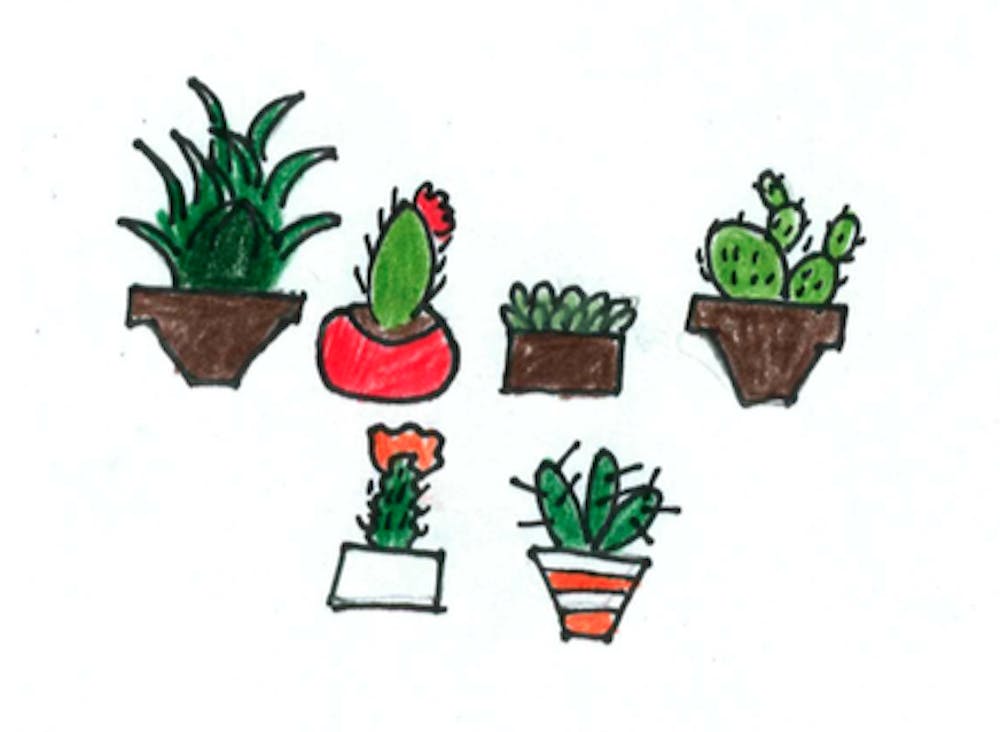It’s not easy being green? Think again. Little changes can make a big impact in creating a greener campus. Representatives from student environmental clubs and the Penn administration shared their tips on how to easily go green.
Reduce
Going green can also mean eating greens — more and more people are adopting “flexitarian” diets to reduce their meat consumption, one of the biggest contributors to carbon dioxide emission. “I am a big proponent of reducing meat consumption. I know it’s hard for a lot of people, but I like to say, even make one meal a day meatless,” said Susan Radov (C ’18), former head of Penn Environmental Group (PEG).
Last year, Penn Dining Services introduced Meatless Mondays during lunchtime in the dining halls. On these days, a handful of Penn dining halls stopped serving meat at lunch. On other days of the week, there is always at least one vegan entrée.
“Students can make that choice to eat only plants, and they have that option. If students want to eat sustainably, they can,” Dan Connolly, Registered Dietitian for Bon Appétit, said.
The University launched the program not only for eco–friendly reasons, but also health reasons. According to the Sustainability Office, “reducing your intake of meat reduces heart disease and stroke, limits cancer risk, and curbs obesity. It also minimizes water usage, reduces greenhouse gases and lowers our fuel dependence.”
There were mixed responses from students: “It’s tough because a lot of the rhetoric from our side is it is so easy, but some people took it as preach and self–righteous. There is a big problem with encouraging people to be vegan. People will write it off without trying it,” Jisoo Kim (C '18), one of two student coordinators for the Eco–Rep Program on campus, said. With the growing number of vegetarian eateries on campus like the soon–to–open Goldie Falafel, it is easier (and tastier) than ever for Penn students to eat less meat.
Reuse
Perfect for a college student's budget, another way to be more eco–friendly is to reuse instead of disposing. In your house, invest in a set of silverware instead of plastic utensils and cook in large batches instead of buying single servings. “If you have your own kitchen, invest in Tupperware to keep your leftovers. You’ll save money and food,” Susan advocates.
Reusable bottles can also be a small change that save the planet and your money. BYO mugs at coffee shops like Starbucks are super useful, and on campus, they help students save big bucks. Last year, the Undergraduate Assembly approached The Dining Advisory Council with an initiative to reduce coffee cups on campus. Together they developed a program called Keep Our Campus Brewtiful that sells reusable coffee cups in retail locations for $7.99, and it is a dollar refill at any non–franchise location. The Dining Advisory Council includes one member of PEG to represent the student body’s sustainability interests. “They are very vocal. We have made changes because of them, like the reusable bottles,” said Pam Lampitt, Director of Business Services for the University of Pennsylvania.
Recycle
Struggling to decide where to toss your trash? Penn uses a single–stream recycle system on campus, making the decision a whole lot easier. Most items can be disposed of in the recycling bins, such as glass, plastic, metal, paper, and cardboard. The only materials that should go in the landfill are Styrofoam, food–soiled items, and food waste when there isn’t a compost bin. The worst offenders are what Lampitt describes as “the flagrant five:” condiment packets, straws, stirrers, napkins, chopsticks. These items cannot be recycled and lead to excessive waste. “While students can’t completely stop using napkins, the chopsticks, the stirrers and the packets, students can try to avoid.”
On campus, Penn’s Sustainability Office has created initiatives to decrease trash contamination in the recycling bins like color–coded bins and adding lids to make it harder to just toss your trash. “We conducted a trash audit to see if people were recycling. If there is enough trash in [the recycling bin], it all has to go to the waste,” said Jisoo Kim.
In your off–campus home, recycling can create revenue for the City of Philadelphia that is reinvested in public schools, parks, and libraries. While you might be doing your part, your favorite coffee shop or restaurant might not: Philadelphia businesses have recently come under fire for not following the city's recycling laws. Almost four–fifths of businesses operating in Philadelphia have not filled out and submitted the required recycling plan. Still, one of the best and only ways to fix this is by demanding recycling as customers.
How to Become More Involved
For students that want to create a bigger impact, there are seventeen different clubs on campus dedicated to environmental causes. They are connected under the Student Sustainability Association at Penn (SSAP), an umbrella group that also works alongside the University. For more information, visit their website.

